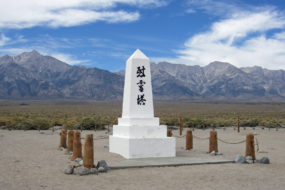February 15, 2017 • Life for Leaders
As he taught, Jesus said, “Watch out for the teachers of the law. They like to walk around in flowing robes and be greeted with respect in the marketplaces, and have the most important seats in the synagogues and the places of honor at banquets. They devour widows’ houses and for a show make lengthy prayers. These men will be punished most severely.”
Mark 12:38-40
 About sixteen years ago, I was talking with Rick Warren, pastor of Saddleback Church in Southern California. Rick was telling me excitedly about a book he was writing. In fact, he hoped to finish his manuscript on the very day we were speaking. As Rick talked about this book, I was intrigued and told him I hoped to read it. He promised to send me an advance copy, which he did, several months later.
About sixteen years ago, I was talking with Rick Warren, pastor of Saddleback Church in Southern California. Rick was telling me excitedly about a book he was writing. In fact, he hoped to finish his manuscript on the very day we were speaking. As Rick talked about this book, I was intrigued and told him I hoped to read it. He promised to send me an advance copy, which he did, several months later.
I’ll never forget reading the first lines of The Purpose-Driven Life: “IT’S NOT ABOUT YOU. The purpose of your life is far greater than your own personal fulfillment, your peace of mind, or even your happiness. It’s far greater than your family, your career, or even your wildest dreams and ambitions. If you want to know why you were placed on this planet, you must begin with God. You were born by his purpose and for his purpose.”
“Wow!” I whispered to myself. “That’s amazing. This book is going to be a bestseller.” Little did I know that The Purpose-Driven Life would sell well over 30 million copies and become one of the bestselling Christian books of all time.
“It’s not about you.” That’s something I need to hear every now and then. Perhaps you do too. It’s terribly easy for those of us who have achieved some measure of success to begin to experience life as if it was, indeed, all about us.
Of course, this is nothing new. Two thousand years ago, Jesus warned his followers about the “teachers of the law” who acted as if it were all about them. They liked to “walk around in flowing robes and be greeted with respect in the marketplaces,” as well as to have the most important seats in religious and social gatherings (12:38-40).
Jesus criticized this kind of self-absorption. But what bothered him even more was the fact that those who were so full of themselves also treated powerless people unjustly. In particular, they “devour widows’ houses” (12:40). Though we don’t know exactly how the puffed up leaders did this, clearly they used their social and economic advantage to enrich themselves by taking advantage of widows, people who had little power or protection in that culture. Those who do such things, Jesus said, “will be punished most severely” (12:40). This isn’t a new thought in Scripture. You can find similar observations throughout the Old Testament. In Psalm 146:9, for example, it says, “The LORD watches over the foreigner; he sustains the fatherless and the widow, but he frustrates the ways of the wicked.”
It’s not wrong to be a person of social prominence, whether you’re a teacher of the law, a successful business leader, a politician, a pastor, an athlete, or a media sensation. But it is wrong to act as if it’s all about you. And it is horribly wrong to use your position to unjustly advance yourself at the cost of those who lack your prominence. Rather, we should use whatever influence we have to serve those who are in need. As it says in Proverbs 19:17, “Whoever is kind to the poor lends to the LORD, and will be repaid in full.”
In my conversation with Rick Warren, he asked about what I was writing. I told him about my latest manuscript, a book on truthfulness. “Hey,” Rick said, “I’d love to help you in any way I can. Just let me know what I can do.” Nervously, I said, “Well, you could write an introduction.” “Great,” he responded. “I’m happy to do it.”
Rick did indeed write an introduction to my book, Dare to Be True, which sold about .02% as many copies as The Purpose-Driven Life. (Oh well!) But what I experienced in Rick’s willingness to write for me was his own humility and integrity. For Rick, it wasn’t about him. It was about loving the Lord and serving people. May you and I be this kind of person for the sake of God’s kingdom.
QUESTIONS TO CONSIDER:
Have you ever watched people act rather like the teachers of the law to whom Jesus refers? How did you react to them?
Have you ever acted like these teachers of the law? Have there been times in your life when you have let it be “all about you”?
What helps you to be humble, to be a servant of others?
How can you use the power you have been given to serve others?
PRAYER:
Gracious God, I can easily look down my nose at the teachers of the law and others like them. I can think of people in this world who make it all about them, and who use their advantage to hurt others. “Someday they’ll get what they deserve,” I tell myself.
But then, Lord, I realize that I can make it all about me. I can enjoy my own success and status more than is wise. I don’t know if I’ve ever taken direct advantage of someone poor or powerless, but I know I’ve benefited from structures and systems that have helped me while hurting others. Forgive me, Lord.
Help me, I pray, to follow the example of Jesus, to serve rather than being served, to give my best for the sake of others. Keep me, Lord, from hurtful pride. Help me seek justice, not just in my personal life, but also in the systems and structures of which I am a part.
In all I do, Lord, may you be glorified. Amen.
Explore more at the Theology of Work Project online Bible commentary: Finance Can Be a Means of Justice and Love

Dr. Mark D. Roberts is a Senior Strategist for Fuller’s Max De Pree Center for Leadership, where he focuses on the spiritual development and thriving of leaders. He is the principal writer of the daily devotional, Life for Leaders, and the founder of the De Pree Center’s Flourishing in the Third Third of Life Initiative. Previously, Mark was the Executive Director of the De Pree Center, the lead pastor of a church in Southern California, and the Senior Director of Laity Lodge in Texas. He has written eight books, dozens of articles, and over 2,500 devotions that help people discover the difference God makes in their daily life and leadership. With a Ph.D. in New Testament from Harvard, Mark teaches at Fuller Seminary, most recently in his D.Min. cohort on “Faith, Work, Economics, and Vocation.” Mark is married to Linda, a marriage and family counselor, spiritual director, and executive coach. Their two grown children are educators on the high school and college level.




